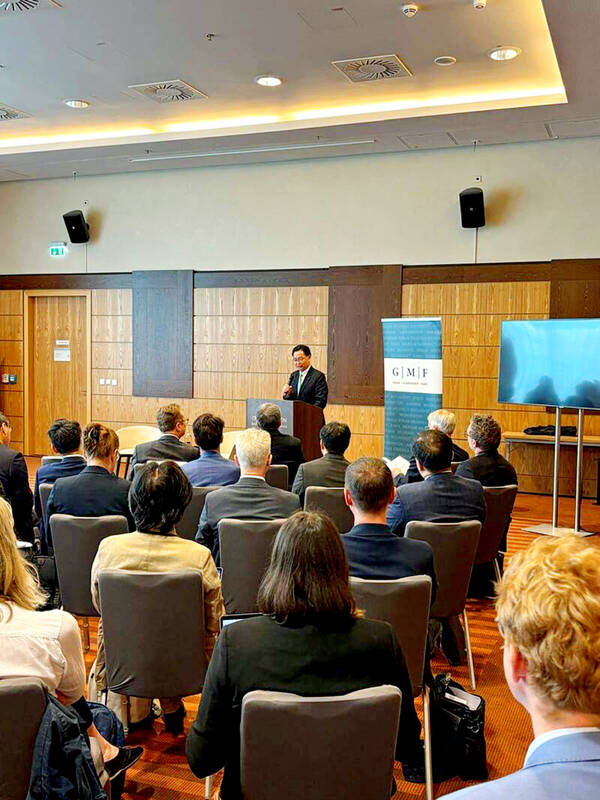Beijing, Moscow, Tehran and Pyongyang are working closely together in an effort to undermine the rules-based international order, National Security Council Secretary-General Joseph Wu (吳釗燮) told a forum in Berlin on Wednesday during a low-profile visit to Europe.
In the face of growing threats amid ever-increasing collaborations between the nations “with a clear intent to expand, to sabotage the rules-based international order ... we the democracies must unite,” Wu said at the eighth Taiwan Trilateral Forum, hosted by the German Marshall Fund of the US.
Wu said that his visit to Germany is a reflection of the EU’s “Indo-Pacific tilt,” and cited how European states, including Germany, France, the UK, and Lithuania, and the EU itself, have all issued Indo-Pacific strategies.

Photo from the German Marshall Fund Web site
He also cited the freedom of navigation operations conducted by the German, French and British navies, showing that Europe is “waking up” in the Indo-Pacific.
Wu urged the EU to speak out against any unilateral attempt to change the “status quo” in the Taiwan Strait, and implored the EU to exercise caution when citing the “one China” policy, which Wu said was being used by Beijing to “legitimize its aggression against Taiwan.”
The concept is what enables China’s expansionism, which poses a threat to the rules-based world order, as the Chinese military constantly holds ad hoc “combat readiness joint patrols” without warning, an act that flagrantly flouts international laws, norms and concerns, he said.
Beijing’s “one China” principle is an enactment of legal warfare and is “no longer a concept subject to interpretation or negotiation,” but rather a goal-oriented strategy to build “a facade of legitimacy for military action, that the conflict is domestic and no others have the right to intervene,” Wu said.
In the same vein, UN Resolution 2758 was being twisted by the People’s Republic of China (PRC) to claim sovereignty over Taiwan and exclude it from international forums, when the resolution itself “has no bearing on Taiwan,” he said.
China’s “gray zone” activities — actions that fall below the threshold of a kinetic war — have recently included efforts to sever Taiwanese undersea communications cables with ships flying flags of convenience, Wu said, citing the Baltic Sea cable severance and stating that this is an issue that EU nations could sympathize with.
“Some friends have described that the PRC has already started the war on Taiwan, not by tanks and missiles, but by algorithms and legalese across the cognitive domain,” Wu said.
Wu likened Taiwan to the two Berlins after World War II, stating that Taiwan is “an island surrounded not by bricks and barbed wire, but by diplomatic isolation, gray zone coercion, hybrid and legal warfare.”
When democracies stand together, authoritarians will hesitate, and if Taiwan and Europe remain united in purpose, Taiwan would one day be a story of freedom and survival, rather than one of fear and surrender, he said.

“China is preparing to invade Taiwan,” Deputy Minister of Foreign Affairs Francois Wu (吳志中) said in an exclusive interview with British media channel Sky News for a special report titled, “Is Taiwan ready for a Chinese invasion?” the Ministry of Foreign Affairs said today in a statement. The 25-minute-long special report by Helen Ann-Smith released yesterday saw Sky News travel to Penghu, Taoyuan and Taipei to discuss the possibility of a Chinese invasion and how Taiwan is preparing for an attack. The film observed emergency response drills, interviewed baseball fans at the Taipei Dome on their views of US President

The Central Weather Administration (CWA) today issued a "tsunami watch" alert after a magnitude 8.7 earthquake struck off the Kamchatka Peninsula in northeastern Russia earlier in the morning. The quake struck off the east coast of the Kamchatka Peninsula at 7:25am (Taiwan time) at a depth of about 19km, the CWA said, citing figures from the Pacific Tsunami Warning Center. The CWA's Seismological Center said preliminary assessments indicate that a tsunami could reach Taiwan's coastal areas by 1:18pm today. The CWA urged residents along the coast to stay alert and take necessary precautions as waves as high as 1m could hit the southeastern

ECONOMIC BENEFITS: The imports from Belize would replace those from Honduras, whose shrimp exports have dropped 67 percent since cutting ties in 2023 Maintaining ties with Taiwan has economic benefits, Ministry of Foreign Affairs officials said yesterday, citing the approval of frozen whiteleg shrimp imports from Belize by the Food and Drug Administration (FDA) as an example. The FDA on Wednesday approved the tariff-free imports from Belize after the whiteleg shrimp passed the Systematic Inspection of Imported Food, which would continue to boost mutual trade, the ministry said. Taiwan’s annual consumption of whiteleg shrimps stands at 30,000 tonnes, far exceeding domestic production, the ministry said. Taiwan used to fill the gap by importing shrimps from Honduras, but purchases slumped after Tegucigalpa severed diplomatic ties with Taiwan

The Executive Yuan yesterday approved a southwestern extension of the Sanying MRT Line from New Taipei to Bade District (八德) in Taoyuan, with a goal of starting construction by late 2026. The 4.03-kilometer extension, featuring three new stations, will run from the current terminus at Yingtao Fude Station (LB12) in New Taipei City to Dannan Station (LB14), where it will connect with Taoyuan’s Green Line, New Taipei City Metro Corp said in a statement. This extension will follow the completion of core Sanying Line, a 14.29-kilometer medium-capacity system linking Tucheng (土城), Sansia (三峽)